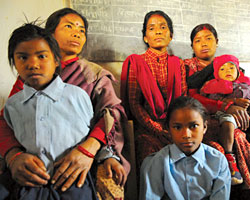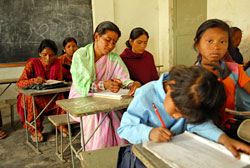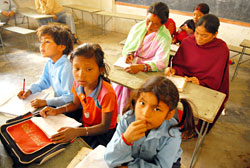 PICS: KONG YEN LIN |
So, with support from her family, the feisty mother enrolled in Grade 1 of a local school in Karjahi in Dang, where she studies in the same classroom as her seven-year-old daughter.
Khima's pioneering efforts to hit the books have been an inspiration to other illiterate women in Karjahi, and 30 other women have enrolled in Grade 1 and 2. They share a common desire to be empowered by education. "My parents are dead but now my own children are like my parents- they educate me," says Khima.
Three years after the end of the People's War, Dang is seeing an increase in female enrolment in schools. Educators attribute this to a rising awareness about the importance of education among parents.
 |
This is the case for Asharami Chaudhari whose parents were brought up as illiterate kamaiyas and kamalaris. For the mother of five, literacy holds the promise of a brighter future. Most spouses have also been supportive of their wives' decision.
"My husband and I came to a consensus that he would earn money while I go to school," says Krishni Chaudhari, "and he wants me to teach him what I've learnt at home!"
Headmaster Hokum Subedi is enthusiastic about his 32 new adult students who sit with their children in the same classes. He says: "Their participation has been a positive example for the community, motivating and encouraging more women to seek formal education."
 |
However, the presence of parents in the classroom can be a double-edged sword. On one hand, the parent-teacher partnership can be strengthened with mothers working together with teachers in solving problems. But classroom dynamics become challenging for teachers as the pace of learning is so different.
"It's hard to manage a classroom where age gaps and natures are so different," says teacher Sita Sharma, "some mothers felt it was hard to concentrate and wanted to be in a separate room."
Despite the enrolment of mothers picking up, Subedi says there just isn't space to have a separate classroom for them. Most mothers have below-subsistence income, so can't afford stationery and school material.
Says Subedi: "It's a pity, we just don't have the resources. There is so much enthusiasm that more mothers want to join schools."


